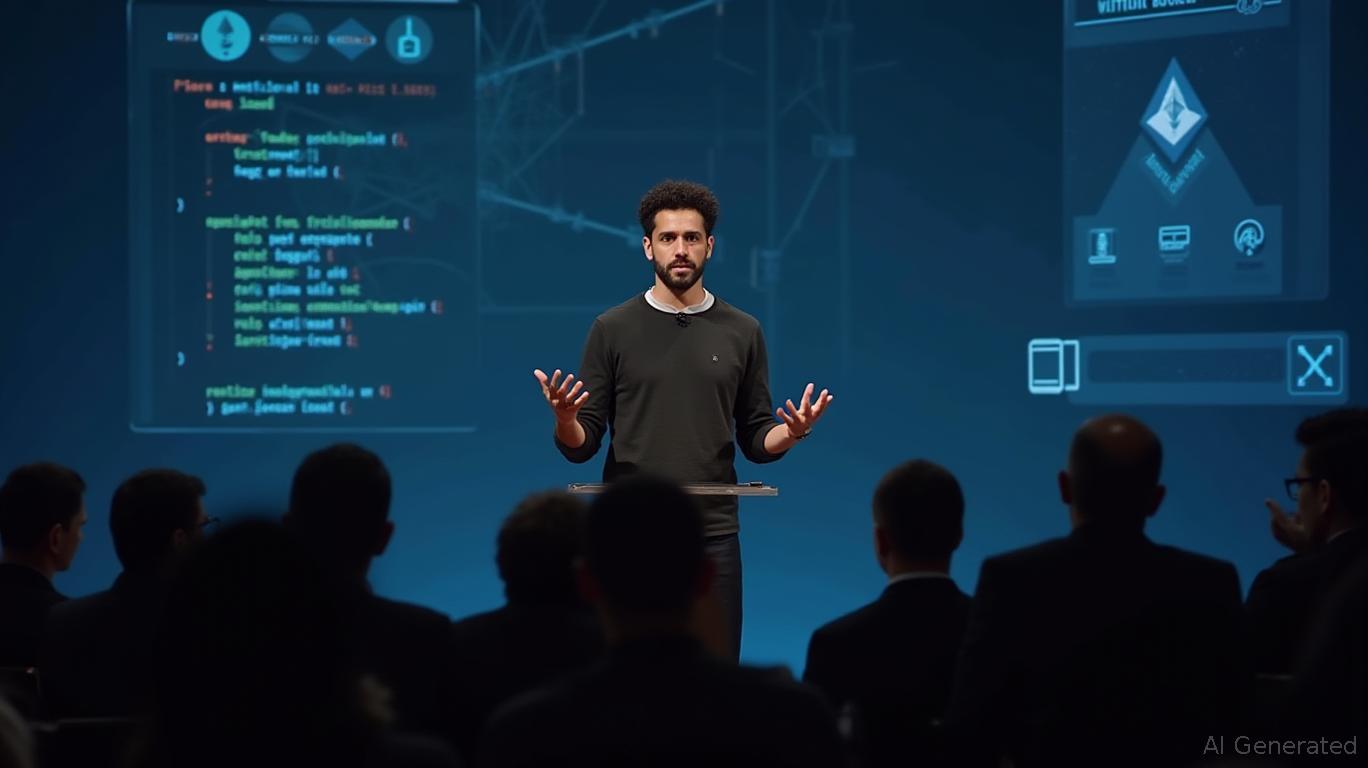Ethereum News Update: Buterin: Relying on Off-Chain Validator Trust Supersedes Mathematical Guarantees, Compromising Security
- Ethereum co-founder Vitalik Buterin warned off-chain validator trust creates critical vulnerabilities, despite on-chain consensus resilience against attacks. - Experts highlighted risks like MEV exploitation, oracle errors, and eclipse attacks, citing historical failures like 2020 bZx protocol breaches. - Market volatility sees Ethereum ETF outflows and 13.75% 60-day price decline, contrasting with bullish 2025 $10,000 price predictions from Fundstrat's Tom Lee. - Developers debate balancing scalability
Vitalik Buterin, one of Ethereum's co-founders, has issued an uncommon alert regarding the dangers of relying on off-chain validator trust. He pointed out that, although Ethereum’s consensus protocol is robust against attacks, systems that depend on validators’ integrity outside the blockchain itself can create significant security flaws. On October 26, Buterin posted a series of messages clarifying that even if 51% of validators act maliciously, they still cannot confirm an invalid block—an essential security guarantee of proof-of-stake networks,
Buterin’s caution has sparked renewed discussion among blockchain developers about the expanding responsibilities of validators in modern blockchain environments. He recognized that Ethereum’s design prevents direct theft of assets on-chain, but warned that validators could still indirectly endanger user funds. For instance, strategies like maximal extractable value (MEV) or censorship could take advantage of validator actions outside the chain. Polygon CTO Mudit Gupta agreed, stating that validators have the ability to “steal money” through MEV, while others, such as Polkadot’s Seun Lanlege, pointed out that malicious validators could disrupt block distribution or carry out eclipse attacks, as reported by Yahoo Finance.

Buterin’s comments come at a time when Ethereum is broadening into decentralized finance (DeFi) and tokenization of real-world assets, both of which depend heavily on off-chain data sources. Past events, such as the 2020 failures of the bZx and Compound protocols due to oracle mistakes, highlight the dangers of external data reliance, as CoinoTag noted. Developers like Robert Sasu from MultiversX have advocated for reducing off-chain dependencies and moving toward fully on-chain solutions to maintain decentralization (reported by Yahoo Finance).
Market trends add further complexity. Ethereum’s price recently hovered around $3,934, marking a 4.85% rise in 24 hours but a 13.75% drop over the past two months (as CryptofrontNews reported). At the same time,
Despite these obstacles, Ethereum’s technological progress persists. By 2025,
This ongoing debate highlights a fundamental challenge in blockchain architecture: finding the right balance between scalability, advanced features, security, and decentralization. As Buterin remarked, “When users depend on validators for actions outside the blockchain, trust takes the place of mathematics” (as BeinCrypto explained). With Ethereum’s market capitalization at $474.89 billion, participants must carefully weigh these trade-offs as the network integrates with traditional finance and expands to a global scale (as CryptofrontNews reported).
Disclaimer: The content of this article solely reflects the author's opinion and does not represent the platform in any capacity. This article is not intended to serve as a reference for making investment decisions.
You may also like
Ethereum News Today: Ethereum’s Network Expands Rapidly While Investors Lean Toward Bitcoin
- Ethereum's on-chain activity hits five-month high, driven by DeFi growth, stablecoin transfers, and smart contract executions, with daily active addresses reaching 550,000. - DeFi platforms like Aave show increased liquidity ($32B TVL), while stablecoins dominate gas expenditure, burning 48 ETH daily in transaction fees. - Layer 2 solutions reduce costs (gas below 1 gwei), capturing 15% of Ethereum's economic output, as ETH price recovers to $4,164 amid mixed short-term volatility. - Bitcoin attracts $93

ZKP: The Unseen Force Driving the Trust Transformation in Decentralized AI
- ZKP blockchain combines decentralized AI computation with zero-knowledge proofs to address scalability, privacy, and resource fairness in AI systems. - Its dual consensus model (Proof of Intelligence + Proof of Space) rewards nodes proportionally for computational and storage contributions, preventing centralization. - Privacy-first architecture uses zk-SNARKs/zk-STARKs to verify computations without exposing data, enabling secure collaboration while maintaining regulatory compliance. - A decentralized d

Bitcoin News Update: Are SpaceX’s Anonymous Bitcoin Wallets a Calculated Strategy or an Indicator of Market Liquidity?
- SpaceX transferred $133.7M in Bitcoin to unlabeled wallets this week, its first major blockchain activity since July 2025. - The company holds 6,970 BTC ($770M), ranking fourth among private firms, though holdings dropped from 25,000 BTC in 2022 due to market volatility. - Analysts suggest the transfers consolidate old wallets, but unlinked addresses raise speculation about liquidity needs or strategic repositioning. - Tesla separately holds 11,509 BTC ($1.27B), generating $600M in profits via accounting

NOWPayments Eliminates USDT Fees to Boost Crypto Adoption Among Businesses
- NOWPayments offers new partners zero-network-fee USDT (TRC20) transactions for two months to boost crypto adoption in iGaming, eCommerce, and high-risk sectors. - The initiative aims to demonstrate crypto's cost-effectiveness, with real-time settlement, under-3-minute transactions, and 0% mass payout fees. - CEO Kate Lifshits highlights the platform's 0.5%-1% fee structure for other services and expanded custodial solutions since its 2019 launch. - The move aligns with rising demand for fast, transparent
